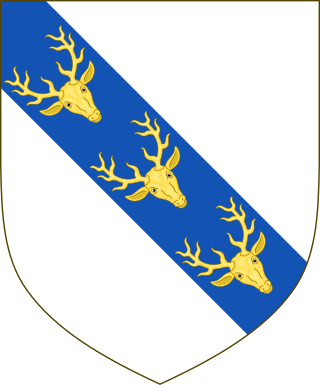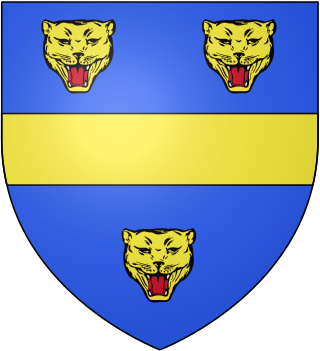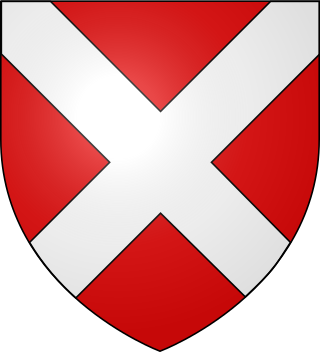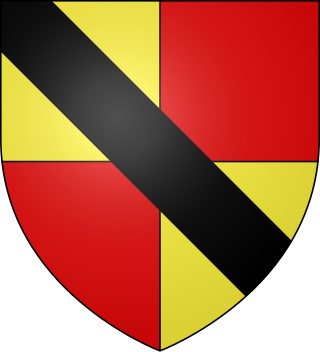Related Research Articles

Sir Henry Percy, nicknamed Hotspur, was an English knight who fought in several campaigns against the Scots in the northern border and against the French during the Hundred Years' War. The nickname "Hotspur" was given to him by the Scots as a tribute to his speed in advance and readiness to attack. The heir to a leading noble family in northern England, Hotspur was one of the earliest and prime movers behind the deposition of King Richard II in favour of Henry Bolingbroke in 1399. He later fell out with the new regime and rebelled, and was slain at the Battle of Shrewsbury in 1403 at the height of his fame.

The Duchy of Athens was one of the Crusader states set up in Greece after the conquest of the Byzantine Empire during the Fourth Crusade as part of the process known as Frankokratia, encompassing the regions of Attica and Boeotia, and surviving until its conquest by the Ottoman Empire in the 15th century.

Sir John Stanley, KG of Lathom, near Ormskirk in Lancashire, was Lord Lieutenant of Ireland and titular King of Mann, the first of that name. He married a wealthy heiress, Isabel Lathom, which, combined with his own great abilities, allowed him to rise above the usual status of a younger son.

Sir James Douglas, 2nd Earl of Douglas and Mar was an influential and powerful magnate in the Kingdom of Scotland.
The Lord Warden of the Marches was an office in the governments of Scotland and England. The holders were responsible for the security of the border between the two nations, and often took part in military action. They were also responsible, along with 'Conservators of the truce', for administering the special type of border law known as March law.

Michael de la Pole, 1st Earl of Suffolk, 1st Baron de la Pole, of Wingfield Castle in Suffolk, was an English financier and Lord Chancellor of England. His contemporary Froissart portrays de la Pole as a devious and ineffectual counsellor who dissuaded King Richard II from pursuing a certain victory against French and Scottish forces in Cumberland and fomented undue suspicion of that king's uncle John of Gaunt, 1st Duke of Lancaster.
This is a list of the High Sheriffs of the English county of Northumberland. The High Sheriff is the oldest secular office under the Crown. Formerly the High Sheriff was the principal law enforcement officer in the county but over the centuries most of the responsibilities associated with the post have been transferred elsewhere or are now defunct, so that its functions are now largely ceremonial. The High Sheriff changes every March.

The Duchy of Neopatras was a principality in southern Thessaly, established in 1319. Officially part of the Kingdom of Sicily, itself part of the Crown of Aragon, the duchy was governed in conjunction with the neighbouring Duchy of Athens, it enjoyed a large degree of self-government. From the mid-14th century, the duchies entered a period of decline: most of the Thessalian possessions were lost to the Serbian Empire, internal dissensions arose, along with the menace of Turkish piracy in the Aegean and the onset of Ottoman expansion in the Balkans. Enfeebled, the Catalan possessions were taken over by the Florentine adventurer Nerio I Acciaioli in 1385–1390. The title of Duke of Neopatras was held by the heir of the King of Sicily.

Walter Skirlaw was an English bishop and diplomat. He was Bishop of Durham from 1388 to 1406. He was an important adviser to Richard II of England and Henry IV of England.
The Baronetcy of Clavering of Axwell was created in the Baronetage of England on 5 June 1661 for James Clavering, the grandson of James Clavering (1565–1630), a merchant adventurer of Newcastle upon Tyne, who was mayor of that city and who bought the estate of Axwell Park, near Blaydon, Northumberland in 1629.

Ralph Neville, 2nd Baron Neville of Raby was an English aristocrat, the son of Ralph Neville, 1st Baron Neville de Raby by Eupheme de Clavering.
Sir Nicholas Brembre was a wealthy magnate and a chief ally of King Richard II in 14th-century England. He was Lord Mayor of London in 1377, and again from 1384–5,6. Named a "worthie and puissant man of the city" by Richard Grafton, he became a citizen and grocer of London, and in 1372-3 purchased from the Malmains family the estates of Mereworth, Maplescomb, and West Peckham, in Kent. His ties to Richard ultimately resulted in his downfall, as the anti-Richard Lords Appellant effectively took control of the government and imprisoned, exiled, or executed most of Richard's court. Despite Richard's efforts, Brembre was executed in 1388 for treason at the behest of the Lords Appellant.

Warkworth Castle is a ruined medieval castle in Warkworth in the English county of Northumberland. The village and castle occupy a loop of the River Coquet, less than a mile from England's north-east coast. When the castle was founded is uncertain: traditionally its construction has been ascribed to Prince Henry of Scotland, Earl of Northumbria, in the mid-12th century, but it may have been built by King Henry II of England when he took control of England's northern counties. Warkworth Castle was first documented in a charter of 1157–1164 when Henry II granted it to Roger fitz Richard. The timber castle was considered "feeble", and was left undefended when the Scots invaded in 1173.
Thomas Waltham, of Kingston upon Hull, Yorkshire, was an English politician.
William de Skipwith was a fourteenth-century English judge, who also served as a judge in Ireland. He held the office of Chief Baron of the Exchequer 1362-5. He suffered temporary disgrace when he was removed from office for corruption, but he was restored to favour, became Lord Chief Justice of Ireland 1370-2, and later returned to the English bench. He appears to have been the only High Court judge to have escaped impeachment by the English Parliament of 1388.
Richard Holiman was an English politician.

Roger fitz Richard, Lord of Warkworth and Clavering, was a prominent 12th-century English noble. He was a son of Richard fitz Eustace and Albreda de Lisours.
Nicholas Fenwick of Pilgrim Street, Newcastle-upon-Tyne, and Lemington, Northumberland was a British Tory politician who sat in the House of Commons from 1727 to 1747.
Sir Thomas Umfraville (c1362-1391) was an English landowner, soldier, administrator, diplomat, and politician who sat in the Parliament of England as member for Northumberland in 1388 and 1390 and also served as High Sheriff of Northumberland in 1388.
References
- ↑ "History of Parliament" . Retrieved 26 March 2020.